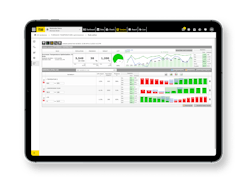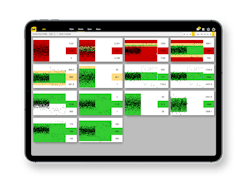Case Study: Food and beverage manufacturer increases throughput, yield by implementing smart IIoT platform
A global leader in the food and beverage industry for more than 30 years, olam food ingredients (ofi) specializes in producing cocoa, coffee, dairy, nut and spice ingredients. The company's 15,000-plus employees work at more than 100 factories around the world, supplying high-quality ingredients to approximately 8,000 customers.
Overview: As part of its digital transformation journey, ofi brought in Braincube to help gain a clearer picture of its manufacturing process. Ofi’s teams quickly uncovered key findings that resulted in a wide array of wins, ranging from a perfect quality score to improved customer satisfaction.
Challenge: Ofi wanted to stabilize and fine-tune one of its product lines in an effort to improve overall yield. The teams were manually collecting data and performing calculations, but they could not get the level of detail they needed to significantly improve their production processes. Ofi also wanted to give employees valuable analytics tools to help them be more effective at solving current — and future — challenges.
Solution: Since implementing Braincube, ofi improved its yield by 6.5% on a key product line by implementing new AI-recommended rules. The company also improved throughput by 25% by minimizing bottlenecks identified by Braincube’s Advanced Apps. Together, with a Braincube-powered Digital Twin, these tools have empowered ofi employees and enabled them to utilize their domain knowledge for continuous improvement.
When it comes to digital transformation, olam food ingredients (ofi) wanted to take the leap into automation. How could the company maximize its process and employee efficiency, while maintaining the high quality of product customers expect?
Advanced troubleshooting with Digital Twin data
One of ofi’s food lines of business wanted to stabilize and fine-tune the production process. Doing so could save on cost, reduce waste and improve performance. The team was already collecting production data, but much of the data collection and calculations were done manually. Employees found themselves spending time on manual data transformation work, which they believed could be automated. This slowed the discovery process, making it difficult to continuously improve their output.
Additionally, the ofi team wanted to adequately pinpoint key sources of variability. The teams had a hunch about where they could optimize their processes. However, without more advanced analytics tools, they had a hard time progressing their troubleshoot-stabilize-optimize continuous improvement strategy.
Ofi learned of Braincube’s Smart IIoT Platform from another food and beverage company. And ofi was confident in its team's ability to meld their subject matter expert knowledge with people-powered AI algorithms and data optimization.
Braincube worked with ofi to build a Digital Twin of the end-to-end production process, tagging each variable throughout the process. The Digital Twin was designed to contextualize data from sensors and systems, and follow the flow of materials by batch. This provided the ofi team with comprehensive, high-quality data coming directly from the shop floor. The ofi team credits the Digital Twin — and the data it provides to their teams — as a key tool in their Industry 4.0 journey.
“Without the Braincube Digital Twin, we couldn’t get the level of detail we needed,” said GK Lee, process and data analytics manager at ofi. “Now, we have a tool that can help our teams make sense of the data that’s coming into our systems. We don’t need to figure out the details we’re looking for; we can start working towards solutions quickly.”
Uncovering real value and ROI
ofi was using other data visualization tools before Braincube, but the company was getting limited value. Bringing in a Braincube-powered Digital Twin was a game-changer for ofi because it showed teams the relationship between process and production performance.
Shortly after building their Digital Twin with their local Braincube team, ofi started making the kinds of discoveries (and time savings) they hoped for.
The Braincube-powered Digital Twin helped bring together data from various systems in a streamlined way to provide teams with granular insights on their most important parameters. Advanced AI, such as the CrossRank AI algorithm used in Braincube’s Advanced Analysis App, illuminated recommended operating setpoints for real-time conditions for these vital parameters.
Using automated Braincube AI in tandem with its process expertise, ofi identified an unexpected cause of variation that had not been previously identified. ofi implemented the newly identified setpoints by pushing these new standards directly to the shop floor using Braincube Live.
By optimizing production standards, ofi improved its primary KPI by 6.5% in just a few months.
Beyond cost savings: satisfied customers
In addition to increasing its yield, ofi also increased throughput by 25% by minimizing various bottlenecks. This increase means the company can adequately meet — and exceed — customer expectations in terms of product delivery. In the high-pressured food market, meeting customer expectations is key.
Increased throughput wasn’t the only way ofi improved its customer satisfaction scores. Since implementing Braincube eight months ago, the ofi team has had a 100% quality score for the products coming off this product line. Minimizing defects means ofi has less wasted product, which is saving the company money. And customers are noticing, too, resulting in higher customer satisfaction.
Leveraging AI and ML
Now that ofi has seen what their Digital Twin data and Braincube platform can do, Lee confirms that “it’s not just about having access to all your data. It’s about having high-quality data.”
High-quality data is also a driving component behind advanced technologies, such as Machine Learning (ML) or AI.
“Machine Learning helps reinforce our own learning about our processes,” Lee said. “This enables us to build a prescriptive strategy.”
To drive that prescriptive strategy, ofi used CrossRank AI in Braincube’s Advanced Analysis App. This app played a key role in helping ofi’s team understand key process parameters for one of their product lines. By cross-referencing hundreds of variables pulled from the Digital Twin, teams could perform big data analyses in minutes.
This saved the team valuable time because they identified where in their process to optimize settings, ranges or temperatures. The teams zoomed in on these key parameters, made additional analyses and put them into production. This helped close their loop. Having a continuous process of discovery, implementation and AI prescription is a positive process change from manually collecting data and performing calculations, as the ofi team did before Braincube.
Still, Lee is quick to emphasize that the AI and Digital Twin data are not doing all of the work for the team. Lee sees these technologies as tools that employees can use to solve problems.
“The actual work takes place when teams use the AI findings to understand and solve problems,” Lee said. “Braincube is a valuable tool because it has enabled us to identify the solutions. This helps our teams perform more effectively.”
In other words, AI and ML play a role in helping employees, but they do not replace their jobs. Instead, these tools enhance their jobs. The employees still must understand what the data and AI findings tell them, requiring detailed implicit knowledge about ofi’s processes.
Embracing change management
When ofi started out on its digital transformation journey, the company was heading into uncharted territory from an organizational standpoint. It had to build a digital team for the Braincube implementation, as this kind of team did not exist at the plant level prior to bringing in Braincube.
Effective change management played a significant role in ofi’s Braincube implementation. Lee knew that he had to get teams on board. He had to find a way to prove the platform’s value to operators and engineers so they would use the tool.
The biggest challenge was convincing operations teams to follow the recommended guidelines coming from Braincube.
“The way I explained it to them is that, yes, you know how to drive a car. But if you don’t have a dashboard with a speedometer, you don’t know how fast you are driving. That can cause problems,” Lee said.
This analogy helped operators understand that Braincube would make their work easier, not replace them. One of the tools that helps ofi’s operators is the Braincube Live App. With Braincube Live, new parameters and operating standards can be sent directly to the shop floor in real-time. Operators can implement these new settings quickly, feeding live data back into the system for further improvements.
Lee credits the ofi team’s domain knowledge for a successful change management strategy.
“The ofi team’s domain knowledge about their processes played a big role in getting operators on board,” Lee said. “Our teams helped Braincube build an accurate Digital Twin of our processes. As a result, the data is accurate and the operators have gained confidence in the tool.”
Driving employee engagement
These advanced tools are also starting to shape employee engagement at ofi. As the company continues its digital transformation journey, Lee hopes that the team can push themselves to take more risks and make new discoveries about their processes.
“If we know that we are guaranteed to improve certain things, we are not actually stretching ourselves,” Lee said.
Lee and the ofi team also see risk-taking as a way to encourage engineers to learn on the job, giving them chances to upskill with technology.
“If the organization supports taking more risks, employees will be challenged to gain more knowledge about their processes, goals, and tasks,” said Lee. “This will help employees understand projects and ideas at a holistic level. As they move into project leadership roles, they can more effectively communicate this knowledge to respective stakeholders.”
Ofi views Braincube and its other digital transformation tools as crucial ways to empower its employees in a continuously competitive landscape. Lee sees 4.0 tools and strategies used at ofi as a company-wide benefit.
“These advanced tools are available now, and they are more accessible than ever,” Lee said. “As a company, we asked: how can we pass these analytics capabilities onto our people?”
Empowering employees
Like most companies taking on digital transformation, ofi’s goal is to make tasks easier for its employees. But that does not mean that these tools minimize or reduce the valuable insights that employees have in their specialized fields of expertise.
In fact, employee domain knowledge is leveraged right from the start of any Braincube project. The input from teams — operators, engineers and plant managers— plays a crucial role in helping Braincube’s teams build a Digital Twin solution correctly.
A Digital Twin is built by bringing together domain knowledge and data from IT/OT teams to effectively drive data democratization and usage across the organization. It is true that data can guide employees towards the right solutions, which saves them time and stress, but the data alone cannot tell employees what to do. Instead, data eases the responsibility of making decisions off of a hunch or guess. Valid data justifies their reasoning and beliefs, making it easier to bridge communication gaps between teams.
Tools designed for users
There are other aspects of Braincube’s platform that ofi finds valuable for its larger strategy and improved cross-departmental communication.
Braincube’s integration capabilities are one of these bonuses for the ofi team. Using Braincube’s APIs, ofi’s various teams are not necessarily required to learn an entirely new system and tool. They can bring their Braincube Digital Twin data into tools that they already use.
Lee also finds Braincube’s visual tools useful for improving communications between operations and engineering. Instead of tables, Braincube’s visual charts and graphs make it easy for anyone to see what is happening. This means teams can do away with a lot of data via tables and utilize Braincube’s visualization tools to tell the story.
“Braincube’s visualization tools give us enhanced clarity on the data,” Lee said. “It’s not just teams talking about these issues in a generic sense. We can get detailed ranges that help us better understand specific problems.”
Scaling as a corporate initiative
Operators and engineers alike were keen to experience the power of Digital Twins and IIoT. Having the right tools at their fingertips has fueled additional continuous improvement efforts and data democratization across the organization. As a result, ofi has implemented Braincube as its IIoT platform at several other factories around the world.
Now that the team has proven the value of the Braincube platform, apps and Digital Twins, they are working with top management to share Braincube’s proven value with their colleagues.
As other product lines and locations continue to implement Braincube, Lee believes there will be a stronger “strategic alignment across the organization.” Even though different ofi factories produce different products, teams can share findings, use cases and projects with each other. This sharing of information and wins can snowball into excitement around the tool and, more importantly, its value. This leads people to feel more connected to their work and to each other.
Lee and his team look forward to amplifying Braincube’s usage to other lines and teams.
Scaling continuous improvement efforts
Lee sees these process improvement wins as important stepping stones in ofi’s overall continuous improvement strategy. The team’s continuous improvement framework goes from troubleshooting to stabilizing to optimizing processes.
The team has maintained 100% quality for an extended period of time and identified optimal centerlining targets for one of their product lines. Now that output is more stabilized, Lee and the ofi team are looking forward to optimizing their processes even further.
The team is confident that these optimizations will lead to further cost and waste reductions, as well as quality improvements, which will have a positive impact on their bottom line and customer satisfaction.
About Braincube
Braincube is an IIoT platform suite with business and expert apps designed for industry. Founded by Laurent Laporte, Hélène Olphe-Galliard and Sylvain Rubat du Mérac in 2007, Braincube has paved the way for artificial intelligence in the industrial world for more than a decade. Braincube’s platform and off-the-shelf apps empower manufacturers to find instant and long-term value from data streams and Big Data analytics. Its operating software provides immediate visibility into live conditions via Edge and provides a hub of analysis apps via Cloud to better optimize performance. www.braincube.com


